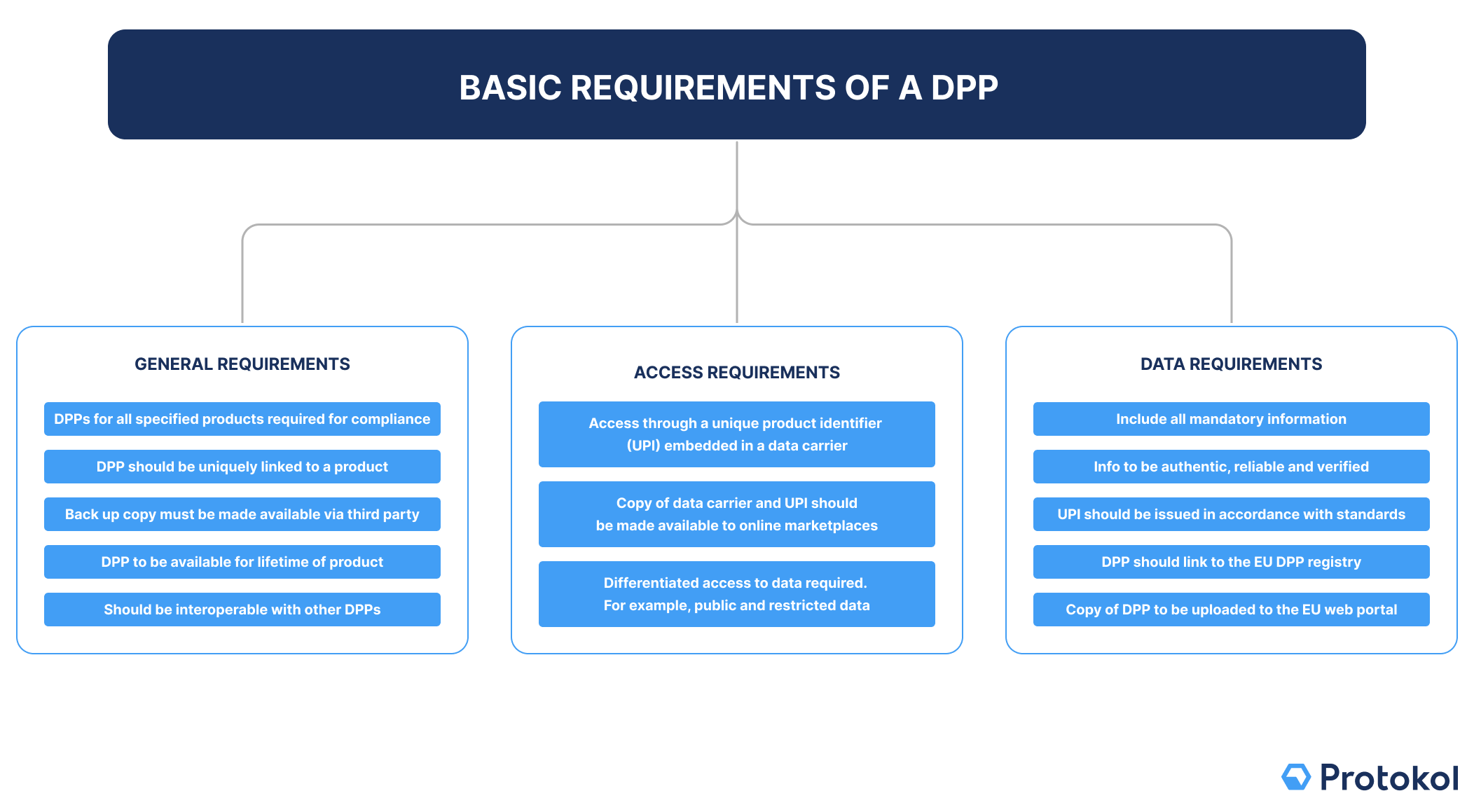Construction is a gigantic, worldwide industry with the current global construction market size totalling $15192.71 Billion in 2023 and employing an estimated 220 Million people. Due to the nature of the business, it’s also an industry with an outsized effect on the environment.
Construction projects account for 23% of global air pollution and 50% of landfill waste. The EU’s construction industry generates one-third of all the waste in the region. These numbers have prompted the EU Commission to prioritise increasing sustainability and circularity in construction.
This is reflected in an updated Construction Products Regulation (CPR) which has measures to increase circularity in construction and includes a mandate for implementing Digital Product Passports across the industry, alongside the more general DPP mandate included in the new Ecodesign for Sustainable Products Regulation (ESPR).
Digital Product Passports (DPPs) and Construction in EU Law
DPPs are a revolutionary new tool for sharing critical information about physical products with stakeholders throughout the supply chain. This data can span the entire product lifecycle – from manufacture to recycling and disposal – giving a holistic, comprehensive, and valuable overview.
DPPs provide a platform to capitalise on the high potential for increased circularity in construction by providing enhanced traceability for construction products and materials moving around the supply chain, access to durability and safety information to purchasers and raw material composition data to waste management organisations.
The ESPR mandates that every product it regulates must have a DPP, accessible by QR code or a similar data carrier. Each product must conform to specific ecodesign standards to comply with the law, and proof of this must be carried within the product’s DPP.
The ESPR came into force on 18th July 2024. The first working plan for the regulation is set to be released in Spring 2025 and will outline the proposed timeline for delegated acts for priority industries.
To further ensure that sustainability and safety measures are met within the built environment, the proposed amendments to the CPR ensure that performance declarations, CE markings, and other construction-specific data are contained within construction product DPPs alongside the EPSR’s information requirements.

Agreed upon in 2023 and 2024, the CPR aims to simplify the regulatory framework, enhance sustainability, and promote digitalisation within the industry, alongside various other requirements for increasing circularity in construction.
While the final version of the CPR is yet to be published, it is expected that the ESPR and CPR will converge to deliver a vision for a fully sustainable, circular construction industry underpinned by a collaborative data-sharing network which utilises Digital Product Passports.
Use Cases for Digital Product Passports in Construction
1. Data Sharing and Collaboration
One of the core capabilities of DPPs is the potential for sharing data amongst supply chain stakeholders – an especially crucial attribute for improving circularity in construction.
The built environment often involves a complex supply chain with many moving parts. Besides construction companies, you have product manufacturers and suppliers, architects, project managers, waste management organisations, and more.
The complexity of this network can lead to losses and inefficiencies in building projects due to miscommunications (such as timing and delivery issues), often caused by a general lack of information sharing. This then increases wasted resources across the construction supply chain. For example, 13% of products delivered to construction sites are sent directly to landfill without being used.
Adopting Digital Product Passports across construction industry ecosystems would help to create an interconnected network for data sharing between the various actors, aiding product management and unlocking efficiencies by improving supply chain traceability.
Access to information such as material sourcing, composition, and environmental impact enables construction companies to manage their supply chain more effectively and remove materials suppliers that don’t meet their sustainability requirements, aiding compliance with various ESG directives such as the CSRD and CSDDD.
DPPs can also provide product declarations, environmental data, and product safety information in standardised, machine-readable formats. This will help to simplify audits and ensure that business practices meet the regulatory requirements of the CPR.
2. Decarbonisation & Waste Management
As previously mentioned, construction is a high-wastage industry that releases an enormous amount of CO2 into the atmosphere – attributes that have placed the industry in the crosshairs for sustainability-led reforms.
By offering comprehensive data on a product’s lifecycle, DPPs support the principles of circular economies and sustainable construction. They enable the tracking of materials for reuse, recycling, and repurposing, which can be updated throughout the product’s lifecycle.
DPPs can include product-level carbon emissions data which construction firms can use to identify high-emission processes and products. This can help them reduce their reliance on unsustainable materials and manage their overall carbon footprint, leading to decarbonisation across the industry.
Specialist recycling companies can utilise the product data within DPPs during their operations to increase the amount of reusable material they can extract from construction waste. They can then add the necessary safety and durability information to the newly recycled product’s DPP to sufficiently inform the purchaser of the recycled goods’ performance potential.
For waste management organisations, DPPs can also contain disposal information for unsalvageable construction products to help minimise the environmental impact of the disposal process.
3. Sustainable Design
Whilst supply chain sustainability is a major focus for increasing circularity in construction, the design side of projects also plays a part. Approaching the initial design phase of a construction project with sustainability at the front of mind helps to set a precedent for the practical process.
This can include using more ‘green’ or recycled resources to build with, planning ethical waste management into the construction process, and calculating the most efficient utilisation of resources.
There are several roadblocks to sustainable building, however. Alongside transitional costs, product quality and traceability concerns are core reasons for the resistance to switching from traditional raw materials in construction projects.
Whilst companies tend to set targets for including recycled materials in their building projects, few follow through – recycled materials amounted to only around 11.7% of the total used within the EU for construction in 2021. DPPs could help with the uptake of recycled and sustainable materials in construction planning by providing verifiable product information related to quality assurance, durability, and longevity.
For example, steel is a high-impact industry identified by the ESPR for sustainability overhaul and DPP adoption as early as 2027. This is an opportunity for construction planners, as steel products being recycled will already have a DPP containing all the necessary information.
This could help inform Building Information Management (BIM) technologies used for smart construction planning, enabling architects to confidently model and map out their building plans using sustainable materials such as recycled steel where possible.
Equally, the provenance of raw material composition and manufacturing information afforded by DPPs could also help construction firms prove their building projects use sustainable materials and work towards stomping out greenwashing within the industry.
Conclusion
Construction has been identified as an industry ripe for a sustainability refit, and laws such as the ESPR and CPR are mandating Digital Product Passports as the informational infrastructure to achieve circularity in construction.
Construction organisations can begin preparing themselves for the coming reforms by familiarising themselves with the latest ESPR and CPR requirements, the role of DPPs and their effect on construction product procurement – including intermediary products like steel.
Construction is a complicated industry with many stakeholders and a complex supply chain. Protokol’s experts can help you gain a concrete understanding of how to prepare to implement Digital Product Passports, develop a winning DPP solution for your organisation, and help provide a head-start on compliance with the new CPR.






